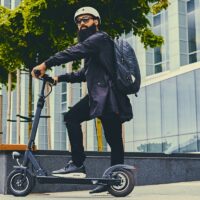What Are the E-Scooter and E-Bike Laws in West Virginia?

E-bikes and e-scooters have made their mark across urban areas all over the nation. What once seemed to be a passing trend appears to be a mode of transportation that is here to stay. E-bikes and e-scooters offer some undeniable advantages as they are rather eco-friendly, affordable to operate, and relatively easy to use.
These electric bikes and scooters have revolutionized pedestrian-friendly transportation. However, with the rise of these electric transportation methods comes the rise of new laws to address safety concerns surrounding them.
The growing safety concerns stem from rising pedestrian and vehicle accidents due to e-bikes and e-scooters, especially in areas where there are limited or no rules or regulations surrounding them. The Insurance Institute for Highway Safety details that without a clear vision of how and where these electric vehicles should operate, they can offer serious safety hazards. Some states like California have clearly defined rules regarding e-bikes and e-scooters. However, other states like West Virginia are only starting to catch up.
Understanding E-Scooter Laws in WV
West Virginia does not currently have any laws regarding e-scooters. However, the state has addressed the use of e-bikes on public roadways. In 2020, the state passed a bill to regulate electric bicycles, where they can be used, and who can operate them.
West Virginia designates e-bikes into two classes, Class 1 and Class 3. The state does not recognize Class 2 e-bikes as bicycles. Class 1 and 3 detail the following:
- Class 1: These bicycles feature a motor that assists riders only when they are pedaling. Once the e-bike reaches speeds of 20 MPH, the motor ceases to assist.
- Class 3: These bicycles feature a motor that provides assistance to riders only when they are pedaling. Once the e-bike reaches speeds of 28 MPH, the motor ceases to provide assistance.
Additional Regulations:
There are additional regulations that riders need to take into consideration with the new law. They include the following:
- E-bicycles are exempt from requiring a license, registration, or insurance.
- E-bike riders must adhere to the same rules that non-motorized bicycles adhere to.
- Riders who are under 15 years of age must wear a helmet when they operate an e-bike.
- Class 1 e-bikes are allowed on bike paths, single-use trails, and multi-use trails.
- Class 3 e-bikes may only be operated by riders 16 years of age and older.
- There may be additional e-bike regulations and rules imposed by different cities, towns, and or jurisdictions. Always consult with your locality to ensure you are not violating local, state, or federal law.
While there are no current laws in place regarding e-scooters, it is likely that regulations will soon follow.
Due to the dangers that exist when operating or sharing the road with someone who is operating an e-bike or e-scooter, it’s important to know your rights. If you have sustained an injury due to an e-bike or e-scooter accident, consult with an experienced and knowledgeable attorney today. At Burke, Schultz, Harman & Jenkinson, our dedicated lawyers can help you seek the representation you deserve. Contact us today for a complimentary consultation.